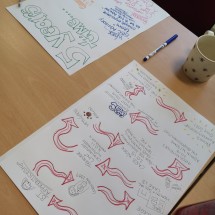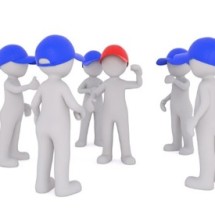Social Facilitation & Social Inhibition – psychology at work

We try to make our teaching, training and interventions as practical as possible here at C&T but underpinning it all is a bit of an obsession with the theory of learning & development. Jade’s degree in Applied Psychology from the University of Durham helps with that and in the past few weeks she has been teaching us more about two key concepts which can have a big impact on performance as well as learning & development : Social Facilitation and Social Inhibition.
Social facilitation- when performance is enhanced due to others being present
Social inhibition- when performance is impaired due to others being present
Whether it’s throwing a ball through a hoop, parallel parking or even trying to execute one of those buzz wire circuit games, many of us seem to have more success when nobody is watching us- but why? Part of the answer lies in decades of Social Psychology research…
Back in 1898, Triplett set up a famous experiment in which he asked children to wind up a fishing reel as fast as they could. Most of the children did the task quicker when another child was doing the task alongside them, than when they were alone. However, a quarter of the children actually took longer to wind the reel when another child did it next to them. Some experienced social facilitation whilst others experienced social inhibition.
Almost a century later Michaels et al. carried out an observational study which uncovered the reason for the different social influences. They noticed that above-average pool players achieved more successful shots when they were being watched, whereas below-average players scored significantly fewer.
Since then a lot of research has confirmed these outcomes – its generally the people who are really good at the activity (or believe they are really good) who are able to move beyond Social Inhibition and benefit from Social Facilitation. We use this understanding in a variety of ways;
- When delivering our people management courses we make sure that potential managers understand that closely supervising or monitoring team members in areas where they know they are weak can have disastrous results as social inhibition closes them down.
- When delivering our behaviour change interventions (such as Leadership Development) we provide plenty of ‘off line’ practice time to build confidence before we ask our participants to try out a new skill in the real world.
- When coaching (groups or individuals) we help people develop a ‘beginners mindset’. Knowing you are new to something, and are therefore ‘allowed’ to make mistakes helps drop your inhibitions when learning and practising in front of others.
- When working with teams we encourage vulnerability. Being able to share your worries, concerns and areas of development allows more honest and open discussion and removes a fear of being perfect.
- If our clients are great at something we encourage them to ‘perform’ and get even better via Social Facilitation. This helps create a virtuous cycle of improvement, particularly when put together with a growth mindset.
If you want to hear more about the theory behind our courses and interventions, why not drop us a line? In the meantime why not think about where you might be experiencing Social Inhibition and find a way to build that skill level to avoid it.









